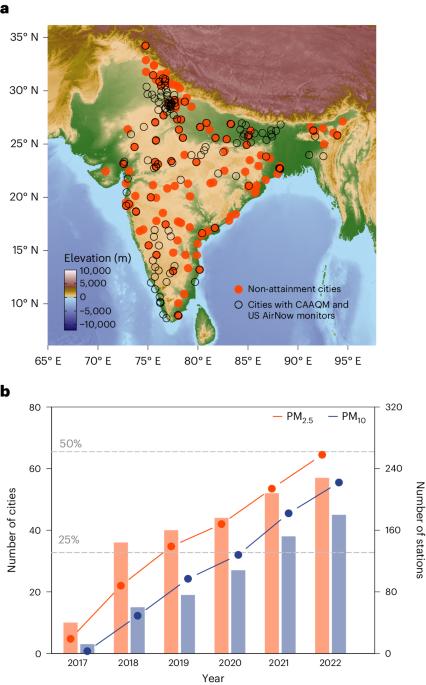Recent PM2.5 air quality improvements in India benefited from meteorological variation
IF 25.7
1区 环境科学与生态学
Q1 ENVIRONMENTAL SCIENCES
引用次数: 0
Abstract
Improving air quality amid rapid industrialization and population growth is a huge challenge for India. To tackle this challenge, the Indian government implemented the National Clean Air Programme (NCAP) to reduce ambient concentrations of particulate matter with diameters less than 2.5 μm (PM2.5) and 10 μm (PM10) in hundreds of non-attainment cities that failed to meet the national ambient air quality standards. Here we evaluate the efficacy of the NCAP using data from the national air quality monitoring network combined with regional model simulations. Our results show an 8.8% yr−1 decrease in annual PM2.5 pollution in the six non-attainment cities with continuous air pollution monitoring since 2017. Four of these six cities achieved over 20% reductions in PM2.5 pollution by 2022 relative to 2017, thereby meeting the NCAP target. However, we find that ∼30% of the annual PM2.5 air quality improvements, and approximately half of the reductions during the heavily polluted winter months, can be attributed to favourable meteorological conditions that are unlikely to persist as the climate warms. Meanwhile, in 2022, annual PM2.5 levels in 44 out of 57 non-attainment cities with continuous monitors still failed to meet air quality standards. This work highlights the need for substantial additional mitigation measures beyond current NCAP policies to improve air quality in India. The Indian government implemented the National Clean Air Programme (NCAP) in 2019 to tackle airborne particulate matter pollution. Based on monitoring data and regional model simulations, this study reveals partial achievement of NCAP targets, but highlights the critical need for additional mitigation measures to further improve air quality in India.

印度近期 PM2.5 空气质量的改善得益于气象变化
在工业化和人口快速增长的同时,改善空气质量是印度面临的一项巨大挑战。为了应对这一挑战,印度政府实施了国家清洁空气计划(NCAP),以降低数百个未达到国家环境空气质量标准的非达标城市中直径小于 2.5 μm (PM2.5)和 10 μm (PM10)的颗粒物的环境浓度。在此,我们利用国家空气质量监测网络的数据,结合区域模型模拟,对 NCAP 的功效进行了评估。我们的结果表明,自 2017 年以来,在六个有连续空气污染监测的非达标城市,PM2.5 年污染率下降了 8.8%。到 2022 年,这六个城市中有四个城市的 PM2.5 污染比 2017 年减少了 20% 以上,从而实现了国家清洁空气行动计划的目标。然而,我们发现,PM2.5 年度空气质量改善的 30% 以及冬季严重污染月份的约一半降幅可归因于有利的气象条件,而随着气候变暖,这些有利条件不太可能持续。同时,到 2022 年,在 57 个有连续监测器的非达标城市中,44 个城市的 PM2.5 年浓度仍未达到空气质量标准。这项工作突出表明,除了现行的国家清洁空气行动计划政策外,还需要采取大量额外的减排措施来改善印度的空气质量。印度政府于 2019 年实施了国家清洁空气计划(NCAP),以解决空气颗粒物污染问题。基于监测数据和区域模型模拟,本研究揭示了 NCAP 目标的部分实现情况,但也强调了采取额外减缓措施以进一步改善印度空气质量的迫切需要。
本文章由计算机程序翻译,如有差异,请以英文原文为准。
求助全文
约1分钟内获得全文
求助全文
来源期刊

Nature Sustainability
Energy-Renewable Energy, Sustainability and the Environment
CiteScore
41.90
自引率
1.10%
发文量
159
期刊介绍:
Nature Sustainability aims to facilitate cross-disciplinary dialogues and bring together research fields that contribute to understanding how we organize our lives in a finite world and the impacts of our actions.
Nature Sustainability will not only publish fundamental research but also significant investigations into policies and solutions for ensuring human well-being now and in the future.Its ultimate goal is to address the greatest challenges of our time.
 求助内容:
求助内容: 应助结果提醒方式:
应助结果提醒方式:


